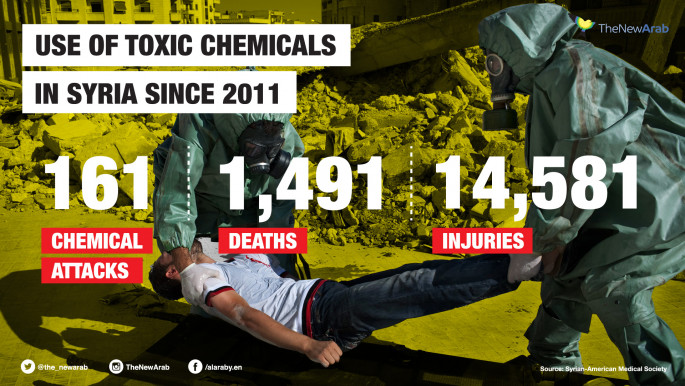Syria's chemical weapons: A short history of denial
Images of Syrians, both young and old, gasping for breath with the assistance of respirators after chemical attacks have sadly become a regular sight emerging from the ongoing catastrophe. This is despite world leaders warning that such tactics would be in violation of "red lines" that would necessitate intervention.
Such tactics have been in use from the war's earlier stages and are well documented by rights groups, the United Nations and other world bodies.
While much of the evidence gathered after chemical attacks indicates that the Syrian regime was behind them, Damascus has stubbornly denied responsibility.
A fourth report inquiry by the United Nations and the United Nations and the Organization for the Prohibition of Chemical Weapons (OPCW) published this month concluded that Syrian government forces were behind a toxic gas attack Qminas, Idlib governorate, in March last year.
Syria's government were swift to dismiss the report's findings – despite this not being the first time that the UN has held Syria responsible for chemical attacks.
In the past, Damascus has blamed Islamist militants for launching chemical attacks, often after having allegedly acquired the capabilities from government controlled areas.
As early as 2012, however, many leading intelligence agencies were certain about Syria's chemical weapons capabilities.
"There is no doubt amongst the UK intelligence community that the Syrian regime possesses vast stockpiles" of chemical weapons, a British parliamentary report from July 2013 read.
A French assessment from September 2013 estimated that Damascus possessed, at the time, over 1,000 metric tons of chemical agents and precursor chemicals. 
The words of Syrian officials also seems to corroborate the likely truth that the Assad regime possessed, or still possesses, deadly chemical weapons.
In July 2012, Syrian military spokesman Jihad Maqdisi assured reporters that "chemical or biological weapons will never be used... no matter what the internal developments of this crisis are."
Maqdisi then went on to explain that Syria's chemical weapons were under their direct supervision and in safe hands.
Syrian officials would later backtrack of the spokesman's words, going as far as denying to deny the weapons' existence.
Syrian Foreign Minister Walid al-Muallem, for instance, responded to allegations about chemical atrocities by saying that Israel possesses nuclear weapons, "regardless of whether we have or do not have" chemical weapons.
In the years that have followed these statements, chemical attacks have continued to be perpetrated across Syria, mainly against rebel-held territories.
One notable atrocity was in Ghouta, a suburb of Damascus, in August 2013. Up to 1,729 people were reported to have been killed when regime rockets struck the area with Sarin gas.
The international outcry that followed Ghouta resulted in a Russian-brokered deal for Syria to relinquish its chemical weapons stockpile in September 2013.
The deal was struck to avoid US military action against Syria.
Since Ghouta and the subsequent deal, however, civilians in Syria have continued to be bombed with chemical cylinders containing chlorine and other harmful substances.
Syria's government has continued to deny responsibility, while world leaders have done little action in response, despite this "red line" being crossed.



